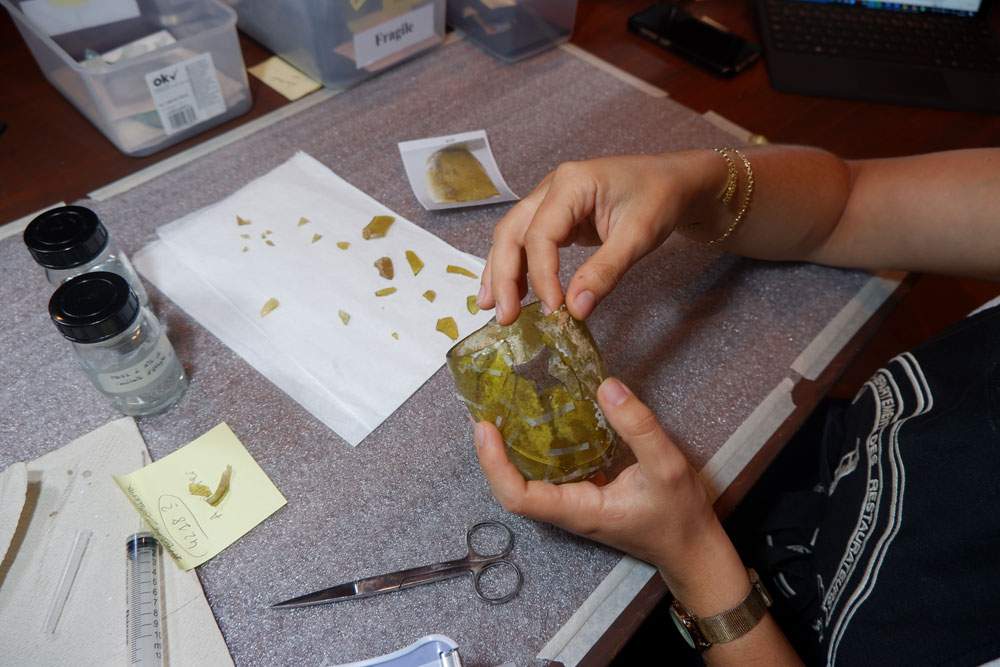The British Museum in London, with support from The European Fine Art Foundation (TEFAF), will restore eight ancient glass artifacts that were severely damaged during the August 4, 2020, explosion in Beirut harbor.
At the time of the explosion, the works, dating from the Roman and early Islamic periods, were on display at the Archaeological Museum of the American University of Beirut (UAB). The display case containing them burst, shattering the glass objects inside. The works were recovered from the case and, thanks to this collaboration between the British Museum and TEFAF, the glass fragments will be reassembled and restored in the conservation laboratories at the London museum site.
The Archaeological Museum of the American University of Beirut is just over three kilometers from the site of the explosion and suffered severe damage to its doors and windows. The case in which the works were stored contained 72 glass containers from the Roman, Byzantine and Islamic periods. Of these, only 15 can be restored, while the others were irretrievably destroyed. Only 8 of the reassembled works are in a condition to be transported to the British Museum, which has the proper facility and expertise to restore and preserve these artifacts.
Hartwig Fischer, Director of the British Museum, said, “Like the rest of the world, we watched with terror the devastating images depicting Beirut last August. We immediately offered the British Museum’s help to our colleagues in Lebanon. Now that we are approaching the first anniversary of the tragedy, we are proud to make the British Museum’s expertise and resources available to save such important ancient objects so that they can be appreciated in Lebanon and around the world for many years to come.”
In July 2021, a French restorer from the Institut National du Patrimoine, visiting Beirut, conducted research and matching work, isolating fragments belonging to each of the artifacts to be shipped to London. The identification was supported by the Friends of the Middle East Department of the British Museum.
Jamie Fraser, curator of the British Museum’s Ancient Levant and Anatolia section, supported by HENI, added, “It is a privilege to collaborate on this important project with the Archaeological Museum. The artifacts survived various disasters and conflicts over 2,000 years, only to be destroyed in the 2020 port explosion. Their restoration reflects the resilience of the Archaeological Museum staff, as well as the importance to Lebanon of its rich cultural heritage.”
“The destruction of these works was a terrible consequence of a broader tragedy affecting the people of Beirut,” commented Hidde van Seggelen, President of TEFAF. “We are proud to support the restoration of the glass exhibits through TEFAF’s Museum Restoration Fund because these are works of immense historical, artistic and cultural value. Restoring them to form is a powerful symbol of healing and resilience in the aftermath of disaster.”
When the works are fully restored, they will be temporarily displayed at the British Museum before returning to Beirut.
The eight artifacts, in this case containers, provide important evidence of the development of glassblowing technology in Lebanon in the first century B.C., when glass production underwent a revolution. This technique enabled the mass production of glass objects of various shapes, making a hitherto elitist material available for everyday and domestic use. Six of the eight artifacts nearing restoration were made using the blown glass technique and show signs of experimentation in both form and function. The remaining two date to the late Byzantine or early Islamic period, and may have been important to Lebanon from nearby locations equally specialized in glassmaking, such as Syria and Egypt.
Nadine Panayot, Director of the Archaeological Museum at the American University of Beirut, said, “The destruction of 72 glass tableware containers dating from the Roman period, some as far back as the first century B.C., represents an invaluable cultural loss for Lebanon and the Near East. We are extremely grateful to the British Museum for its help in restoring the eight glass artifacts from the Archaeological Museum shattered by the Beirut harbor explosion. My thanks also go to TEFAF for its generosity in supporting the project.”
 |
| British Museum with TEFAF will restore artifacts damaged in Beirut port explosion |
Warning: the translation into English of the original Italian article was created using automatic tools. We undertake to review all articles, but we do not guarantee the total absence of inaccuracies in the translation due to the program. You can find the original by clicking on the ITA button. If you find any mistake,please contact us.